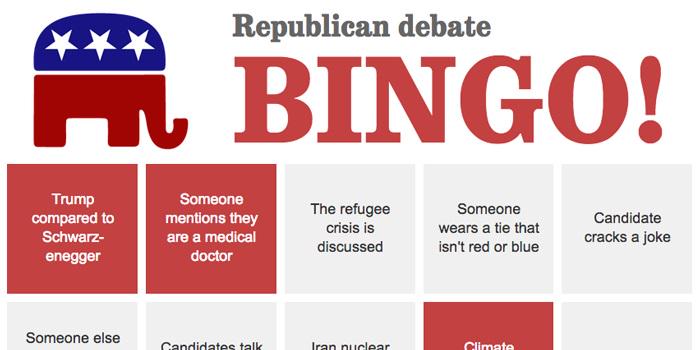Second GOP debate: Carly Fiorina made the most of it, and 4 other takeaways
- Share via
By the numbers
The second Republican presidential primary debate at the Ronald Reagan Presidential Library in Simi Valley is over, and the debate has exposed multiple divisions among the GOP field on issues like abortion, Iran and dumping on Donald Trump. This is what we're watching on Trail Guide, your daily guide to everything 2016:
- Our summary of the debate.
- Trump forced earthward , but still looms large .
- The spin room and post-debate analysis on Twitter .
- Our takeaways from the undercard debate .
5 takeaways from tonight's Republican debate
The main GOP debate in Simi Valley took hours, and it felt like it. There were insults and policy clashes. But the large field made it difficult at times to keep track of who was saying what. Still, we managed these five takeaways:
Politicians are evil: The word "politician" has become the dirtiest insult in the Republican lexicon, even among the politicians themselves running for president. It has become as much of a smear as "liberal" was in 1988, when George H.W. Bush used the term to insult Massachusetts Gov. Michael S. Dukakis, the Democrat he clobbered to win the presidency.
Former Hewlett-Packard Chief Executive Carly Fiorina derisively compared Donald Trump's business record to "politicians [who] have run up mountains of debt using other people's money."
Ted Cruz, the Texas senator, was courting voters "looking for someone to stand up to career politicians in both parties." Scott Walker, who began running for the state Assembly when he was 22, tried to gain outsider cred by denouncing congressional Republicans.
Chris Christie, the New Jersey governor, said he was not an insider because "I'm a Republican in New Jersey. I wake up every morning as an outsider."
So who actually owned up to being a politician? Donald Trump, whose large lead in the polls has inspired all the p-word hate: "I'm now a politician for about three months. Obviously, I'm doing pretty well. I'm No. 1 in every poll by a lot."
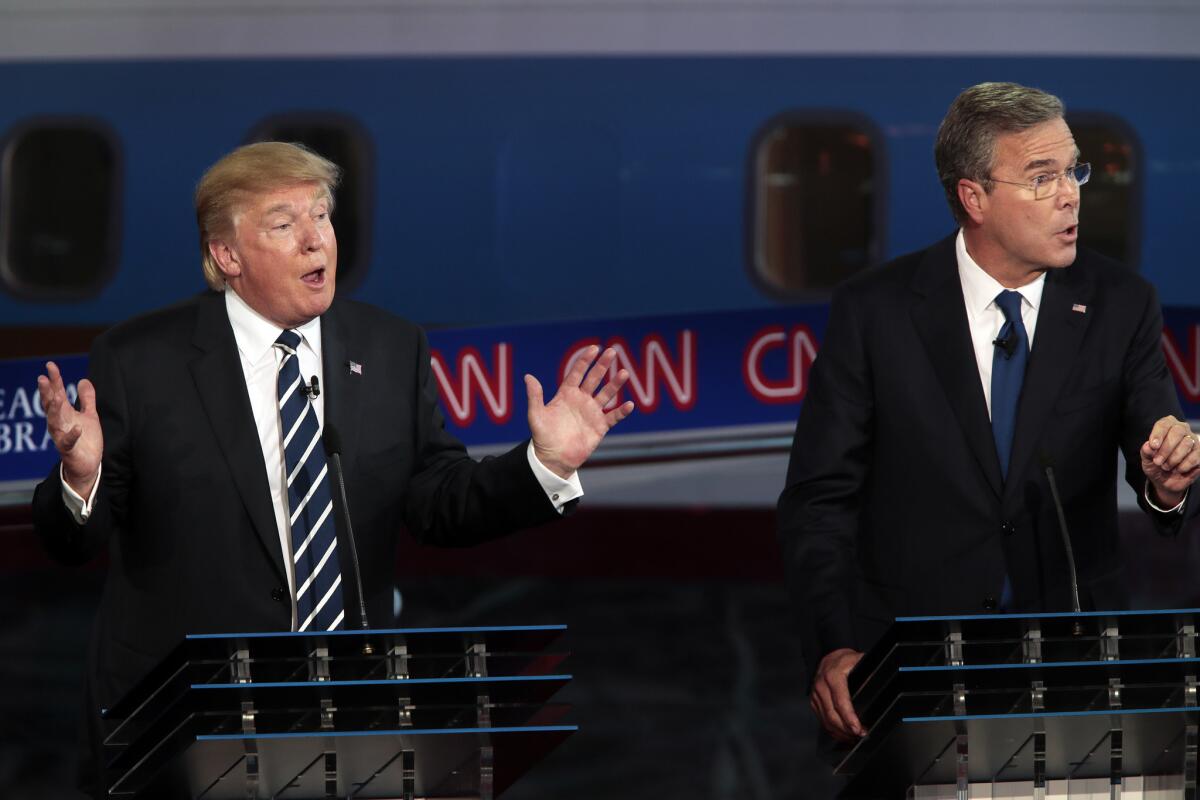
SIMI VALLEY, CA. -- WEDNESDAY, SEPTEMBER 16, 2015 -- Candidates Donald Trump and Jeb Bush square off during the 2015 Republican presidential debate held Wednesday at the Ronald Reagan Presidential Library in Simi Valley. ( Rob Gauthier / Los Angeles Times )
Trump is still getting under Jeb Bush's skin: Bush had vowed to get more aggressive in response to Trump's insults. And he was.
But his face seethed with anger and frustration nearly every time Trump spoke. And almost everything Trump said about Bush dripped with condescension. The two men stood side by side, as they did in the August debate, and CNN's questioners were eager to pit them against each other in several questions.
"OK, more energy tonight. I like that," Trump said to Bush at one point, cutting off the former Florida governor when he was trying to dig at Trump for donating to Democrats.
When Bush called out Trump for pushing casino gambling in Florida, Trump simply denied it. "I promise if I wanted it, I would have gotten it," Trump said.
"No way," Bush retorted. "Believe me."
Their encounter came to a head when Bush demanded an apology from Trump for injecting his Mexican-born wife into the immigration debate. Trump simply refused.
"I won't do that because I said nothing wrong," he said. "But I hear your wife is a lovely woman."
So generous.
Fiorina made the most of the big stage: Fiorina, who has risen in polls since August's debate, was the only candidate to graduate from the second-tier debate last month to the main stage Wednesday.
She gave memorable remarks and repeatedly offered some of the most passionate answers while successfully ducking questions she did not want to field. She spoke personally about burying a child who suffered from drug addiction.
She gave Trump a withering look when moderator Jake Tapper asked about his comment in Rolling Stone that mocked her appearance. Then she managed to denounce him without seeming to engage him: "I think women all over this country heard very clearly what Mr. Trump said," she said.
Then she won the crowd with a passionate denunciation of abortion and Planned Parenthood (without saying directly whether she would shut down the government to cut the agency's funding): "This is about the character of our nation," she said, staring at the camera.
Mike Huckabee won the award for hating the Iran nuclear deal the most: It was a fierce competition. The candidates, even those who would not tear it up on Day One of their presidency, all said it was a mistake. But it was Huckabee, the former Arkansas governor, who said that "this is really about the survival of Western civilization."
Runner-up goes to Cruz, who said he would campaign with this slogan: "If you vote for Hillary Clinton, you are voting for the Ayatollah Khamenei" (pregnant pause) "to have a nuclear weapon," referring to Iran's supreme leader.
Real differences in approaches to foreign policy: The field was divided on how or whether to engage America's rivals on the world stage, a difference that often emerges in both parties.
Fiorina, for example, said she would cut off communication with Russian President Vladimir Putin: "We've talked way too much to him."
Florida Sen. Marco Rubio reiterated his assertion that Putin is a "gangster" who is exploiting a leadership vacuum left by the Obama administration in the Middle East, suggesting he would treat Putin with contempt.
Trump, for all his insults of American political leaders, said he would get along with Putin and other global rivals. "I believe that I will get along," he said. "Between that, Ukraine, all of the other problems, we won't have the kind of problems that our country has right now with Russia and many other nations."
It was another example that Trump's tough rhetoric is often accompanied with surprising positions that set him apart from others in the GOP.
Clinton camp relishes GOP candidates' stances on women's issues
The Republican candidates put considerable effort into attacking Hillary Rodham Clinton during Wednesday night's debate, and the operatives at Clinton campaign headquarters in Brooklyn welcomed much of it.
They said the attacks only highlighted distinctions Clinton is looking to make with a Republican nominee in a general election matchup, particularly on women's issues.
"What will matter for Republicans a year from now is that each candidate stood on the stage and said they would defund Planned Parenthood," Clinton communications director Jen Palmieri told a group of reporters who watched the debate from campaign headquarters. "Some would even shut down the government in order to defund Planned Parenthood."
Clinton, her staff said, did not watch the debate. Earlier in the day she taped the "Tonight Show." Afterward, she decamped to a mansion in Staten Island for a fundraiser.
Palmieri said the Republican debate showed an agenda out of sync with the middle class.
"There was no talk of college affordability, childcare, equal pay," she said "There were not any solutions for families."
She said the campaign would be watching with interest the coming fight in Congress over funding for Planned Parenthood, an issue over which some Republicans have vowed to shut down the government.
"I guess they think there is some political gain to be had, but we know that women ... look at defunding Planned Parenthood as limiting women's health choices."
Palmieri argued that each GOP debate had boosted Clinton's strength with the electorate.
"In each debate ... each candidate seems to be trying to outmaneuver each other in showing a more conservative view. That's damaging to them."
And Palmieri stressed, again, the view of the Clinton campaign: While Trump might be the most colorful of the GOP contenders, he is not an outlier with his views. "We want to make sure the public understands that's not just Trump," she said.
The Clinton campaign's favorite moment in the debate? It may just have been the interaction between Trump and Carly Fiorina when he clumsily recanted an earlier insult about her looks.
"I did appreciate the withering, just withering look [Fiorina] gave to Donald Trump when he said she was beautiful," Palmieri said.
Trump still looms large
In the spin room: Christie advisor and more Trump
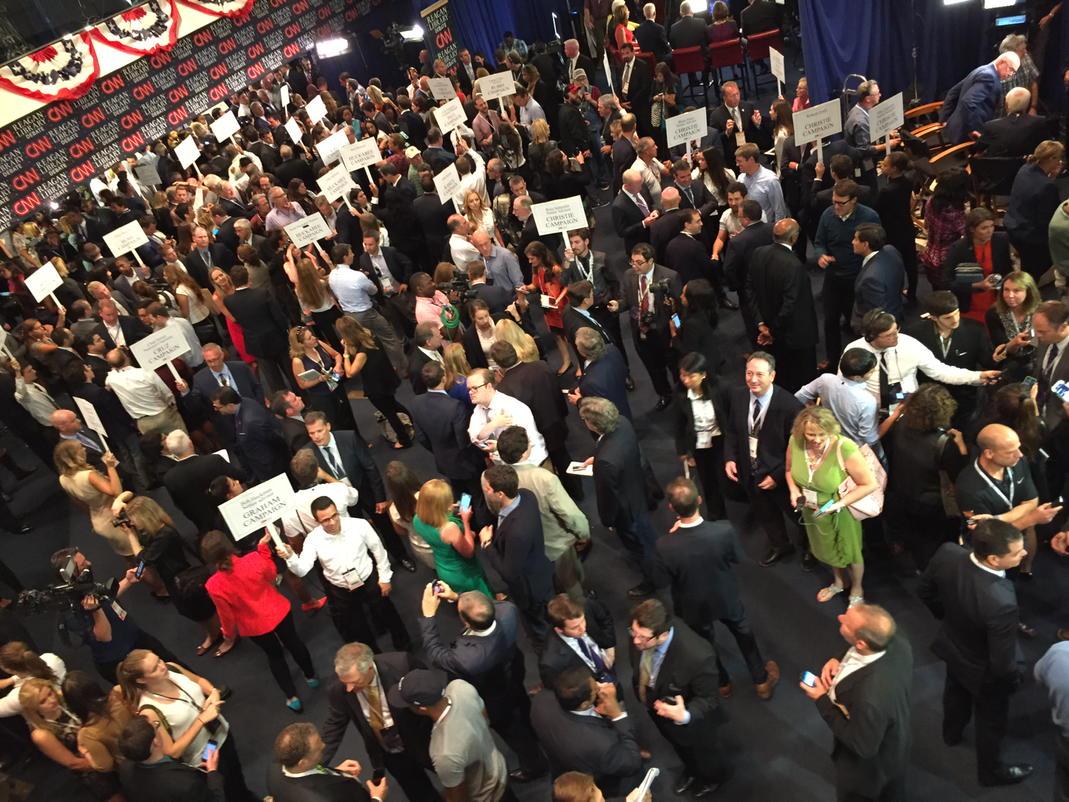
(Robin Abcarian / Los Angeles Times)
Donald Trump was forced earthward tonight
All summer long -- including in last month's first presidential debate -- Donald Trump has floated above the rest of the Republican presidential field, like a malevolent puppeteer pulling everyone else's strings. On Thursday night, in a often bludgeoning debate at the Reagan Library in Simi Valley, Trump was forced earthward by a blast of criticism from most of the rest of the field.
Florida Gov. Jeb Bush struck at Trump's political donations, attitude toward Latinos and criticism of his brother.
Wisconsin Gov. Scott Walker mocked him as a potential “apprentice,” dismissing him as one of the people Trump regularly fired on his TV show. Kentucky Sen. Rand Paul dismissed Trump's character as insufficient for the White House. Florida Sen. Marco Rubio rebuffed his criticism of Spanish speakers. And former Hewlett-Packard CEO Carly Fiorina thoroughly schooled Trump on his business record, his understanding of the Constitution and his rough treatment of women, including her.
She archly referred to Trump as a “wonderful entertainer” whose character would be -- had been -- illuminated in the campaign. And she offered an even more frozen reply when asked her response to Trump's recent criticism of her face, which he had mocked as unworthy of a president.
“I think women all over this country heard very clearly what Mr. Trump said,” Fiorina said, drawing an outbreak of applause from the audience.
“I think she's got a beautiful face and I think she's a beautiful woman,” said Trump with something approaching contrition. Fiorina did not smile.
It would be foolhardy to suggest that Wednesday's event will sharply alter a presidential election that Trump has led for many weeks, a lead that has built despite, and even because of, his incendiary, insult-splaying approach. But it perhaps signaled a more even-handed brawling from this point forward, as the candidates move into a critical fall period.
And here comes Trump
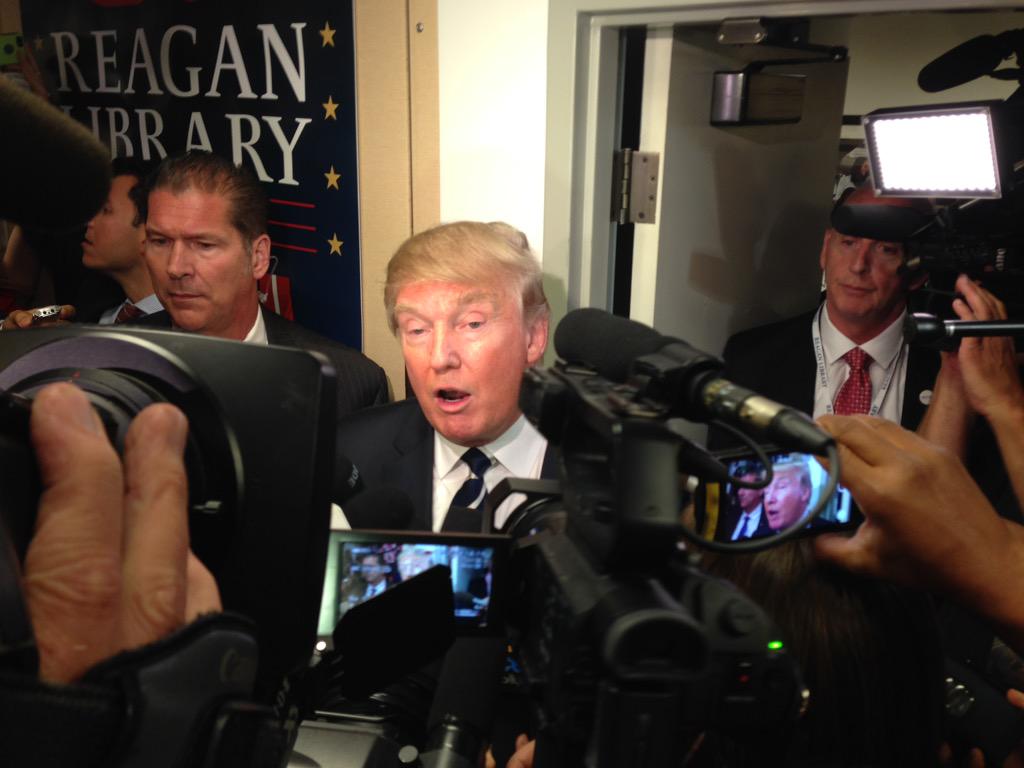
(Chris Megerian / Los Angeles Times)
There's a frightening amount of media surrounding Donald Trump, but he doesn't seem stressed about it. "I thought it was a fair debate," he said.
His feelings about Carly Fiorina, who sparred with him fiercely: "I think she's a very nice woman."
Carson calls Trump 'a comedian'
Quick poll: Pick your code name
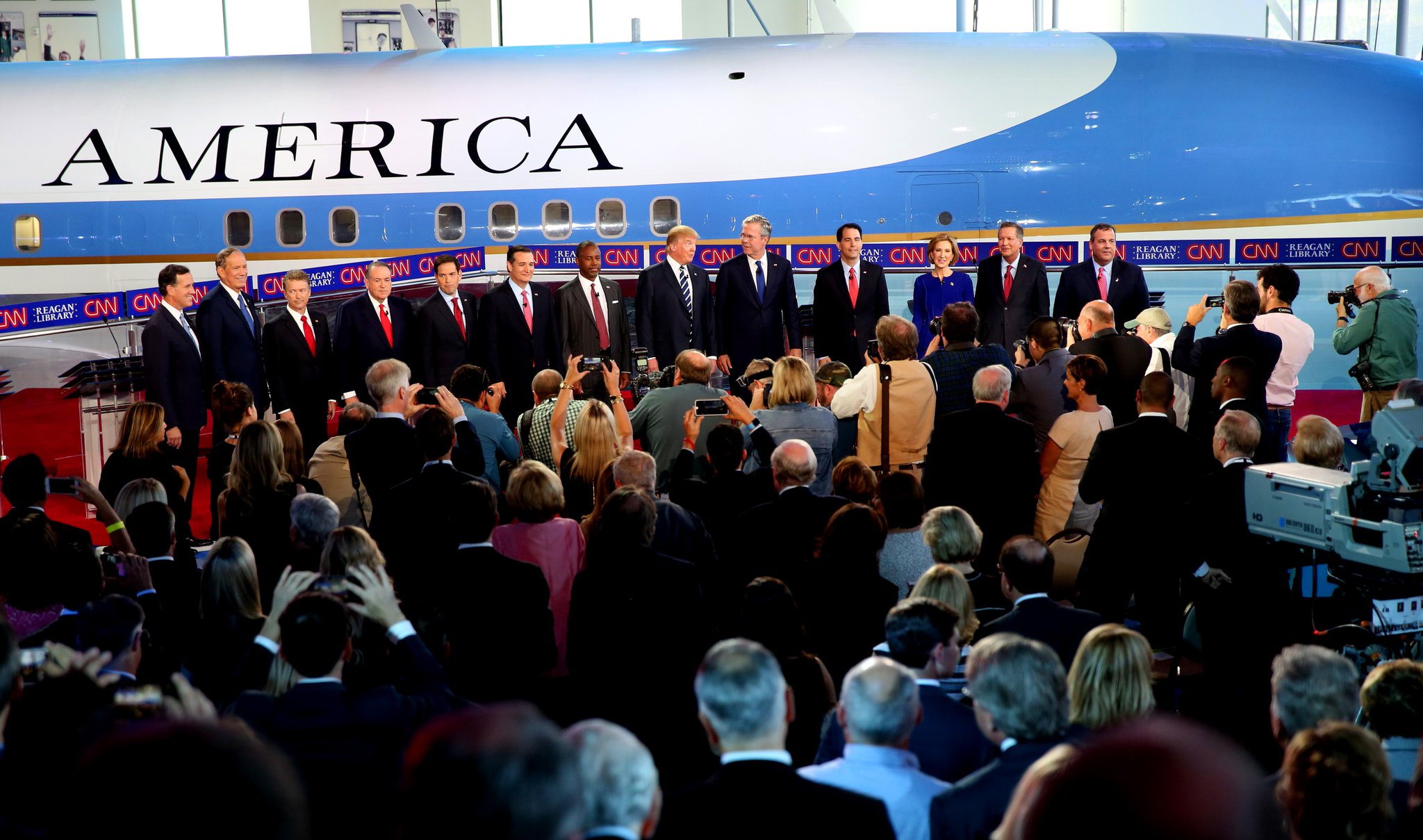
(Robert Gauthier / Los Angeles Times)
Here are the candidates' answers to the second lighthearted question, which closed out the debate: If elected president, what would your Secret Service code name be?
Chris Christie: True Heart
John Kasich: Unit 2 (Unit 1 would be his wife.)
Carly Fiorina: Secretariat
Scott Walker: Harley
Jeb Bush: Eveready
Donald Trump: Humble
Ben Carson: One Nation
Ted Cruz: Cohiba
Marco Rubio: Gator
Mike Huckabee: Duck Hunter
Rand Paul: Justice Never Sleeps
Donald Trump disputes Ben Carson's medical opinion on vaccines
It takes some gumption for a real estate mogul to argue medicine with a preeminent pediatric neurosurgeon. But Donald Trump has gumption to spare.
When CNN moderator Jake Tapper asked Ben Carson about Trump's statements linking childhood vaccines to autism, Carson, the first doctor to separate twins conjoined at the head, said the science was clear: There is no evidence that vaccines cause autism.
But Trump wasn't going to back down. “I've seen it,” he said. Babies are pumped with vaccines in doses meant for a "horse," he said. Children receive too many vaccines all at once, and the result, he suggested, is an autism “epidemic.”
As remarkable as Trump's defense of this position was Carson's decision not to challenge Trump directly. Carson noted that, yes, some believe children are give too many vaccines at once ¿ although he did not say that the regimen was linked to autism.
Trump nodded as Carson spoke, as if the doctor had just seconded his opinion.
Quick poll: Which woman should be on $10 bill?
Here's what the Republican presidential candidates answered in response to Jake Tapper's first "light-hearted" question about recognizing a woman on U.S. currency:
Donald Trump : His daughter, Ivanka*
Jeb Bush : Margaret Thatcher**
Scott Walker : Clara Barton
John Kasich : Mother Teresa**
Rand Paul : Susan B. Anthony
Mike Huckabee : His wife*
Marco Rubio : Rosa Parks
Ted Cruz : Rosa Parks (but put Hamilton on the $20)
Ben Carson : His mother*
Chris Christie : Abigail Adams
Carly Fiorina : No answer, talked about women being more than a special-interest group
Marco Rubio : Rosa Parks
*not deceased ( a person must be dead to appear on U.S. currency)
**not an American
On a theoretical Trump presidency:
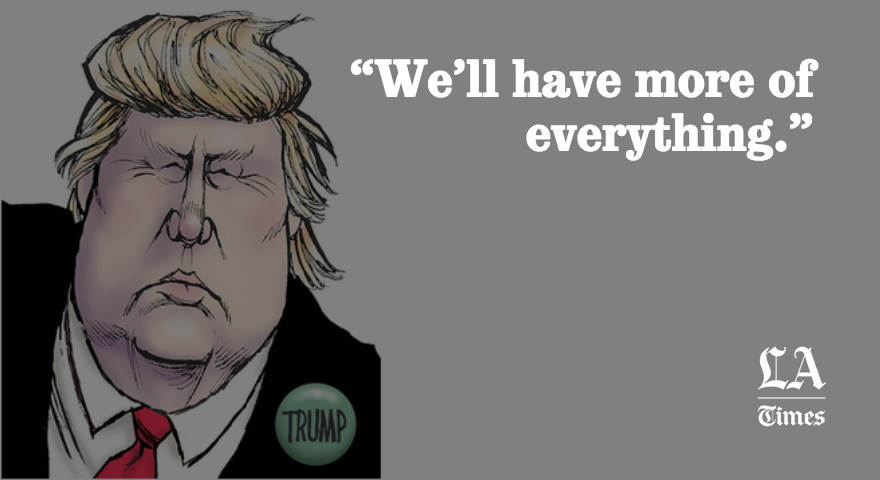
Paws up for...
What would America look like under President Ted Cruz?
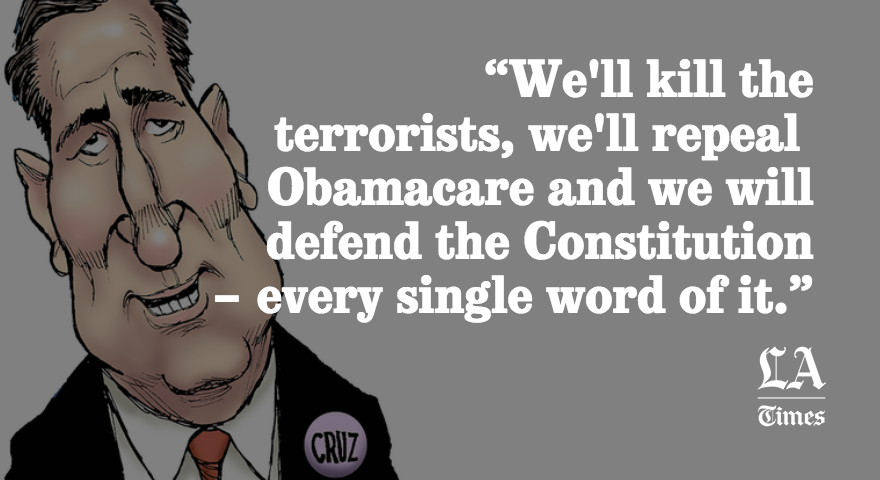
After the debate, candidates will walk into this
Losing the crowd in Escondido
The Lincoln Club's debate watching party at Stone World Brewing in Escondido started out with about 20 big GOP donors and club members.
By the end, only six had stuck around.
Lincoln Club Executive Director Ryan Clumpner was among those who cut out before the conclusion. Before he left, Clumpner said he was impressed with a few candidates.
"I think Carly Fiorina was a dominant force, even more than Trump," he said.
But he noted that when his club had hosted Fiorina and John Kasich earlier this year, Kasich drew a little more than 100 people, a bigger crowd than Fiorina.
Clumpner also was impressed with Mark Rubio.
"Every time he answered a question, he nailed it," Clumpner said.
A young Republican in Rubio's corner
Kelly Kristoff says she couldn't wait to watch tonight's debate. The 2016 presidential election will be the first one in which she'll be able to cast a vote, and she plans on voting Republican.
More specifically, she hopes to vote for Sen. Marco Rubio.
The 17-year-old said she's keeping a close eye on each candidate's stance on immigration reform.
"It needs to be handled in a way that's delicate, but will change and get things done," she said from her seat in one of the front rows at the Los Angeles Times' watch party.
Kelly said she's drawn to Rubio because he's young, confident and well-spoken.
"There's not a lot of fluff there," she said. "He identifies what needs to be handled and has a strong plan."
Kelly, a high school senior, said her government class sparked her interest in politics. She's eager to learn more about the issues to back up her stances, she said.
"I'm hopeful and I'm really excited to vote," she said.
Ben Carson on Trump's medical credentials
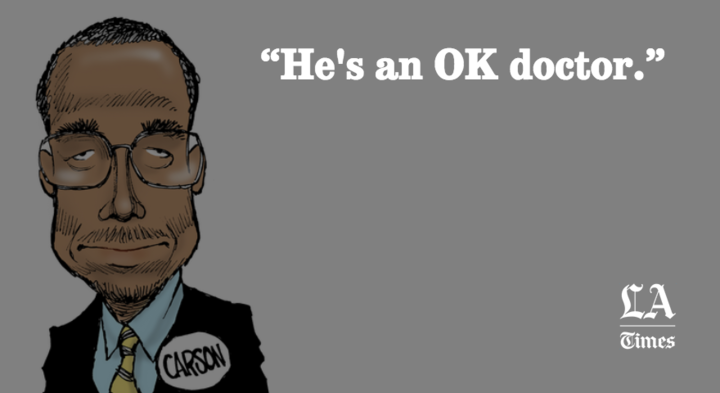
Former GOP Chairman Steele warns candidates: Tone down your rhetoric
Before Donald Trump again chided Jeb Bush for speaking Spanish on the campaign trail, former Republican National Committee Chairman Michael Steele gave some advice: Tone the rhetoric down. Fast.
"I've talked to everyone about toning it down," Steele told The Times before the main debate. "The sooner we change the tone of the rhetoric, the sooner we change the emphasis from exclusion to assimilation and inclusion, the better off the party will be."
The candidates didn't exactly heed his advice.
During the debate, Trump and Ben Carson talked about building a wall along the Mexican border. Trump reiterated his plan to deport millions of immigrants and refused to apologize to Bush's wife, Columba, who is of Mexican heritage, for suggesting Jeb Bush is soft on immigration because of her.
"We have to have assimilation to have a country," Trump said. "This is a country where we speak English, not Spanish."
Steele warned that continued inflammatory rhetoric from Trump and others will cost the GOP votes in down-ballot races come election day.
"That is where everything you say matters 10 times more than it did in a primary," he said. "Oftentimes, what happens is what you said in the primary comes back and bites you in the butt."
Steele said Bush would "embrace" the opportunity to reconnect with Latinos if he wins the nomination.
And if Trump wins?
"He is going to have to work on it," he said.
Christie was not officially named U.S. attorney the day before 9/11
Chris Christie is often quick to point out that he was named the U.S. attorney for New Jersey the day before the Sept. 11, 2001, terrorist attacks. It's a common refrain from the brash governor in response to questions about how he would keep the country safe.
But it's not exactly true.
Christie didn't actually take office until 2002, and he wasn't confirmed by the U.S. Senate until December 2001, nearly three months after the attacks.
The discrepancy was pointed out by Politifact and other media outlets after Christie made the remark during the first GOP debate back in August.
Christie's camp has repeatedly said he was not attempting to mislead anyone. The Star-Ledger, New Jersey's largest newspaper, did report that President George W. Bush called Christie to tell him he would be nominated on Sept. 10, 2001.
"He clearly received the call on Sept. 10," Samantha Smith, a spokeswoman for the Christie campaign, told the newspaper last month. "He is not lying."
Marijuana poses a dilemma for the GOP

There's a big dilemma confronting the party's voters and candidates on the issue of marijuana: They favor a weaker federal government and giving more power to the states in general, but when it comes to pot, a substantial bloc of the party wants the federal government to rein in the states.
"This whole idea of legalized marijuana is twofold for Republicans," David Kopel, an associate policy analyst at the Cato Institute who has researched drug policy, said in May. "Opposition to marijuana use plays well with conservatives, which is the core voter base in the primary. Yet that stance is not popular with the larger electorate."
And, he said, the idea of "state's rights and limiting the reach of the federal government" is crucial to Republican voters - and thus to candidates seeking support.
Is Barbara Bush on Twitter?
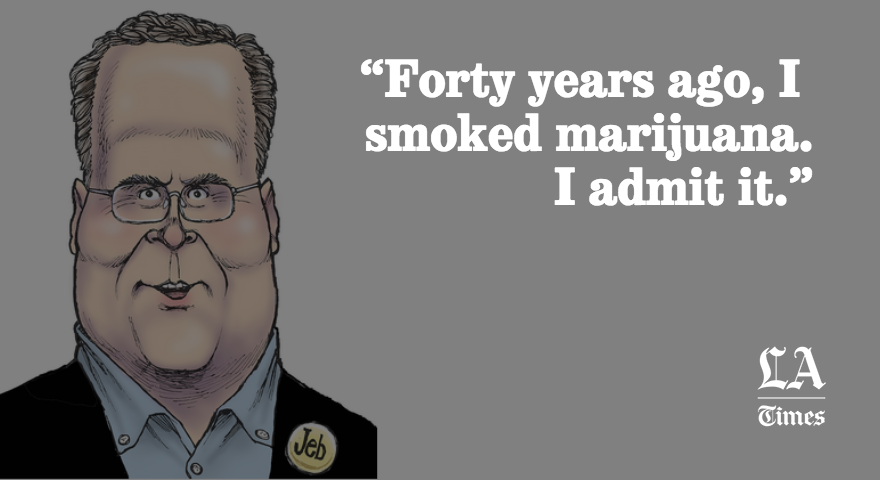
Trump again says he's not beholden to others' money
The question of the influence of wealthy political donors briefly came up during Wednesday's debate, with front-runner Donald Trump again asserting his independence from other people's money, drawing a contrast to his rivals' dependence on donations. Special interests and donors "have a lot of control" over the other candidates, Trump said. "I am not accepting any money from anybody," he said.
Trump, who made a fortune in real estate, reality television and licensing, has said he's willing to spend $1 billion on his own campaign.
Other contenders, notably former Florida Gov. Jeb Bush, spent months early this year scrambling to gather big-money checks for super PACs, which can take unlimited donations and are playing a bigger role than ever in the process this year, though they are technically supposed to be independent from the campaign organizations. Bush said that Trump was the only donor who tried to get something from him, approval for casino gambling in Florida.
Trump once again said Wednesday that he just turned down a $5-million check; he's never given any details about prospective donors. And although super PACs are able to accept unlimited donations, Trump, like other candidates, isn't supposed to be participating in accepting those big checks.
Ben Carson weighed in, saying he was concentrating on small donors and had received more than half a million contributions.
However, it's not clear Trump is shunning all campaign donations. He also has several super PACS supporting his candidacy -- and has appeared at at least one super PAC fundraiser, Politico reported last month. The campaign and representatives for that group, Make America Great Again, did not respond to requests for comment about fundraising.
For the quarter ending June 30, all but $92,000 of the $1.9 million in Trump's campaign fund came from the mogul himself, though that only covered the two weeks after his announcement, when he declared "I'm really rich." A picture of the super PAC activity will come when reports are filed in a few weeks.
Huckabee's key questions for Supreme Court candidates
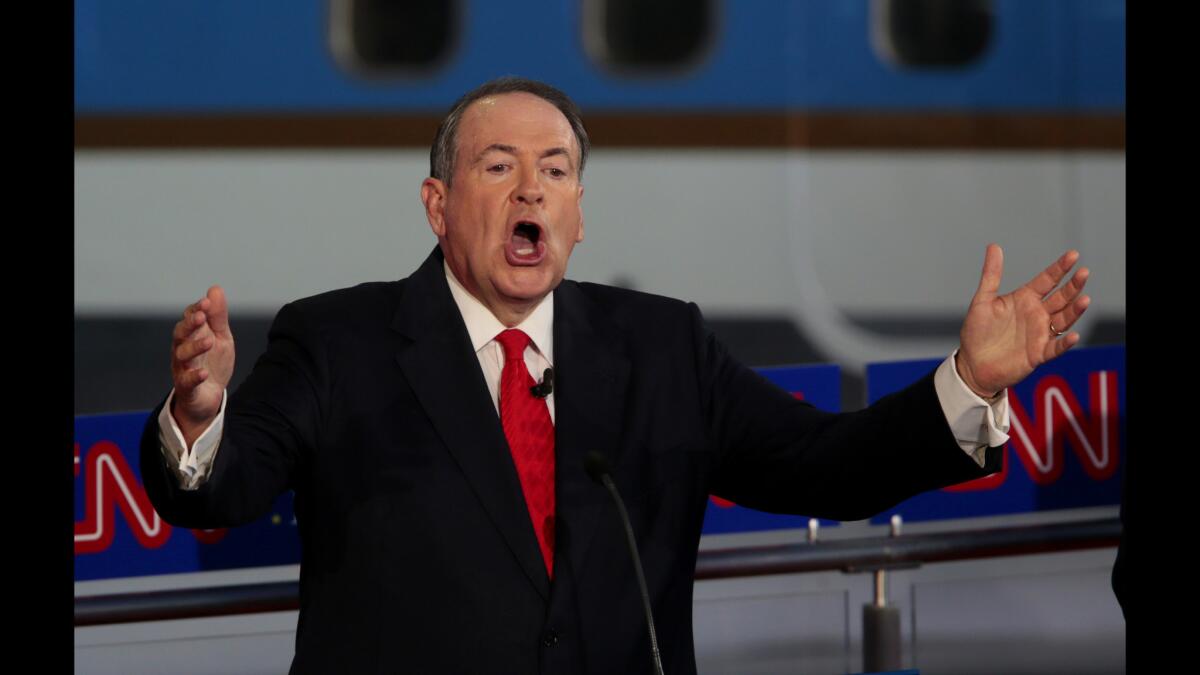
Mike Huckabee
'We need to be mobile and lethal. We need to take care of business and then come home.' --John Kasich, on the Islamic State militant group
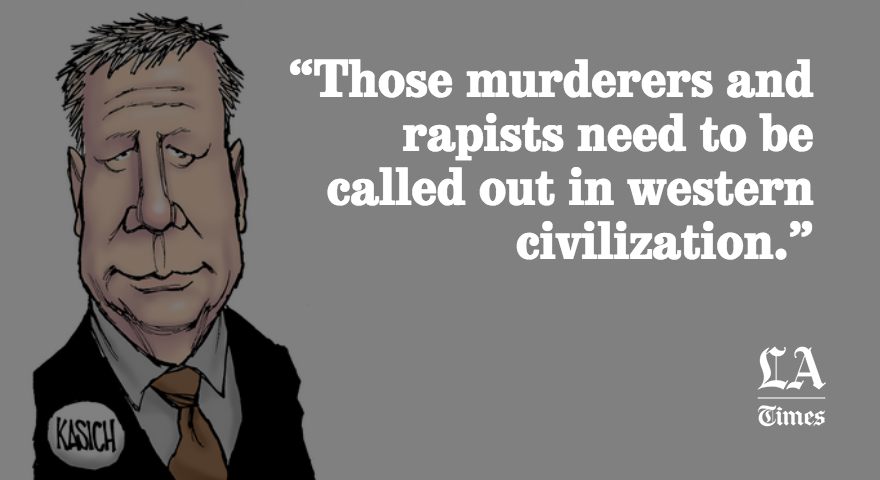
Reagan was more liberal on immigration than today's Republicans
Ronald Reagan's name was invoked 14 times in the first Republican debate last month and is getting a lot of love from the candidates tonight at his presidential library in Simi Valley.
But nearly all of the GOP presidential hopefuls differ dramatically from the Gipper on one key issue: immigration.
In 1986, Reagan signed the Simpson-Mazzoli Act, a bipartisan immigration overhaul bill that created a pathway to citizenship for nearly 3-million immigrants in the country illegally.
In another presidential debate, this one in 1984 between Reagan and Democratic nominee Walter Mondale, Reagan defended the concept of amnesty.
"I believe in the idea of amnesty for those who have put down roots and lived here, even though sometime back they may have entered illegally," Reagan said.
Thought exercise: Consider how a statement like that would play onstage tonight.
Donald Trump and Jeb Bush tangle over speaking Spanish
It probably doesn't get more personal in a presidential campaign than an attack on one's wife. Or language.
Jeb Bush and Donald Trump have tangled for weeks over immigration, and it spilled out on the debate stage when the former Florida governor suggested the celebrity billionaire should apologize for criticizing his wife, Columba, who was born in Mexico.
Trump declined, but did suggest the former Florida governor's wife “is a lovely woman,” before the two sparred anew over the immigration issue that has divided Republicans.
“We're at a crossroads right now,” Bush said. “Are we going to take the Reagan approach, the hopeful optimistic approach, or the Donald Trump approach that everything is bad?”
Trump doubled down on his plans to deport the estimated 11 million immigrants in the U.S. illegally rather than allow them a chance to become legal while remaining in the U.S., as President Reagan did, which many Republicans criticize as "amnesty."
“We will move them out,” Trump said. “The great ones will come back.”
The sparring was an extension of the battle between the two that has played out on the campaign trail.
In a video, Trump criticized Bush's suggestion that immigration was an “act of love.”
Bush and his wife made their own video for Hispanic Heritage Month, showing off their bilingual skills -- with Bush speaking Spanish and Columba speaking English. On Wednesday night, Columba took to Twitter.
“You have to speak English,” Trump said. “To have a country we have to have assimilate. We speak English, not Spanish.”
Bush said he would keep on speaking both languages.
If a student asks a question in Spanish, Bush said, “I'm going to show respect and answer that question in Spanish.”
From the sidelines, one of the two Latino candidates on stage, Sen. Marco Rubio of Florida, jumped into the conversation.
Rubio said that he, too, would continue speaking Spanish because he wants voters to get his message.
“I want them to hear that directly from me, not from a translator at Univision,” Rubio said.
'Fair amount of nastiness'

David Horsey
Los Angeles City Controller Ron Galperin wishes the debaters were being more thoughtful instead of throwing jabs and insults.
"There's a fair amount of nastiness," he said. "I don't think that's what people want to see. They want to see officials work together."
Galperin said he would like to hear concrete steps the candidates would take if they were elected, not just "platitudes."
"This is entertaining, but it's more heat than light," he said.
The Democrat is interested learning how the candidates would help local governments serve their cities and counties, in addition to their views on social issues and foreign policy.
"We have extreme gridlock in Washington," he said. "People should be able to disagree and still work together."
It's hot in there
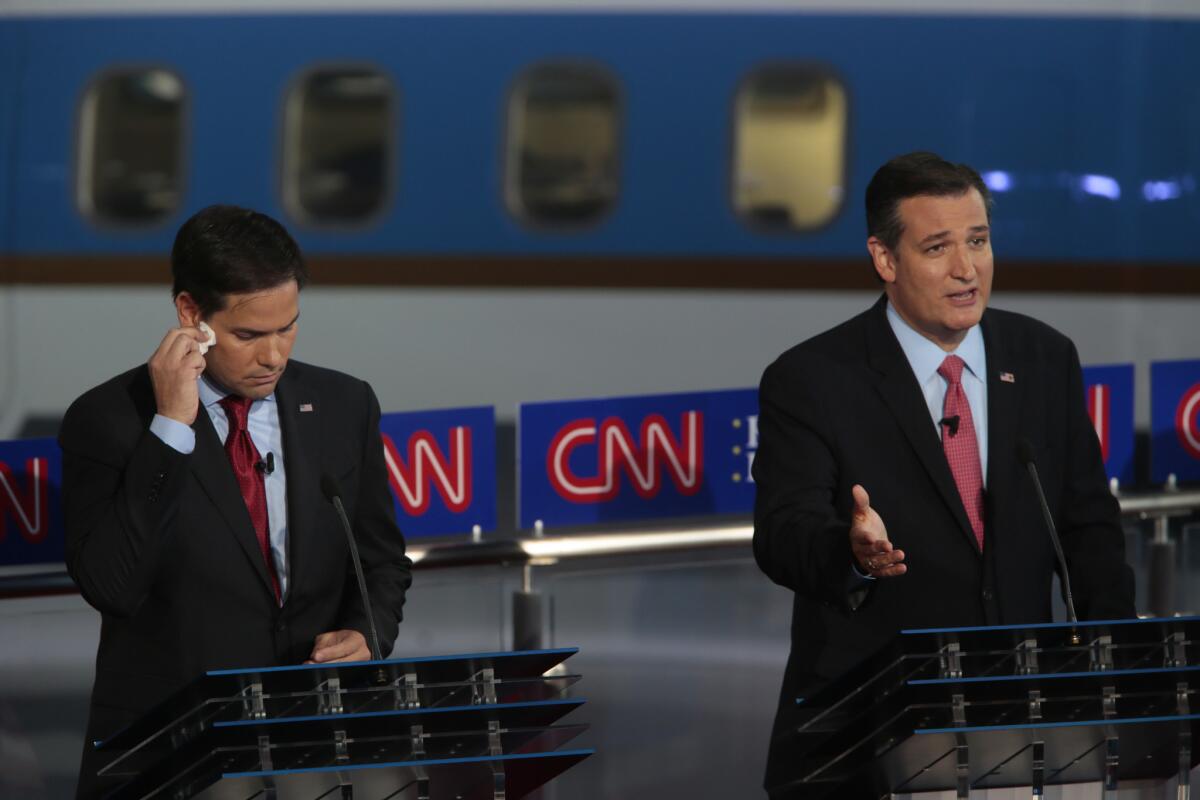
Marco Rubio, left, and Ted Cruz
And more photos from the Reagan Library, where we still have 45 minutes left to go.
Meanwhile, in Brooklyn
At Hillary Rodham Clinton's campaign headquarters in Brooklyn, N.Y., campaign manager Robby Mook said the debate is proving true the Democratic front-runner's oft-repeated claim that the party of Lincoln has become the party of Trump.
“They have a completely out-of-date and out-of-touch philosophy,” Mook told reporters watching the debate from Clinton's campaign office. “I think it is disturbing that Jeb Bush allowed himself to be shushed by Donald Trump. He has completely driven them to the right. You saw more insult, more bluster, more sexism.”
Mook predicted the fiery words against Planned Parenthood by Carly Fiorina and other GOP candidates at the debate would set off a backlash in the general election.
“It will be interesting to see how women across this country respond to that,” Mook said.
But Mook was reserved when it came to the upcoming Democratic debates, and the controversy about how few of them are scheduled. Asked to respond to demands by opponents that Democrats hold more than the six planned forums, Mook demurred.
“I want to let Hillary speak on how many debates she thinks there should or should not be,” he said.
Trump: 'Your brother's administration gave us Barack Obama'
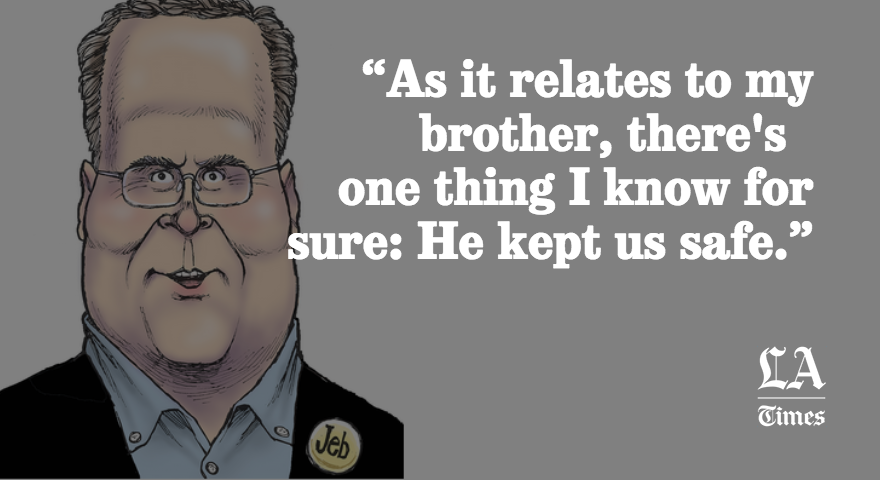
Thumbs up
In San Diego, the donors liked Jeb Bush's line about his older brother, former President George W. Bush. The younger Bush told Donald Trump: "He kept us safe."
The topic that riles Jeb Bush: His family
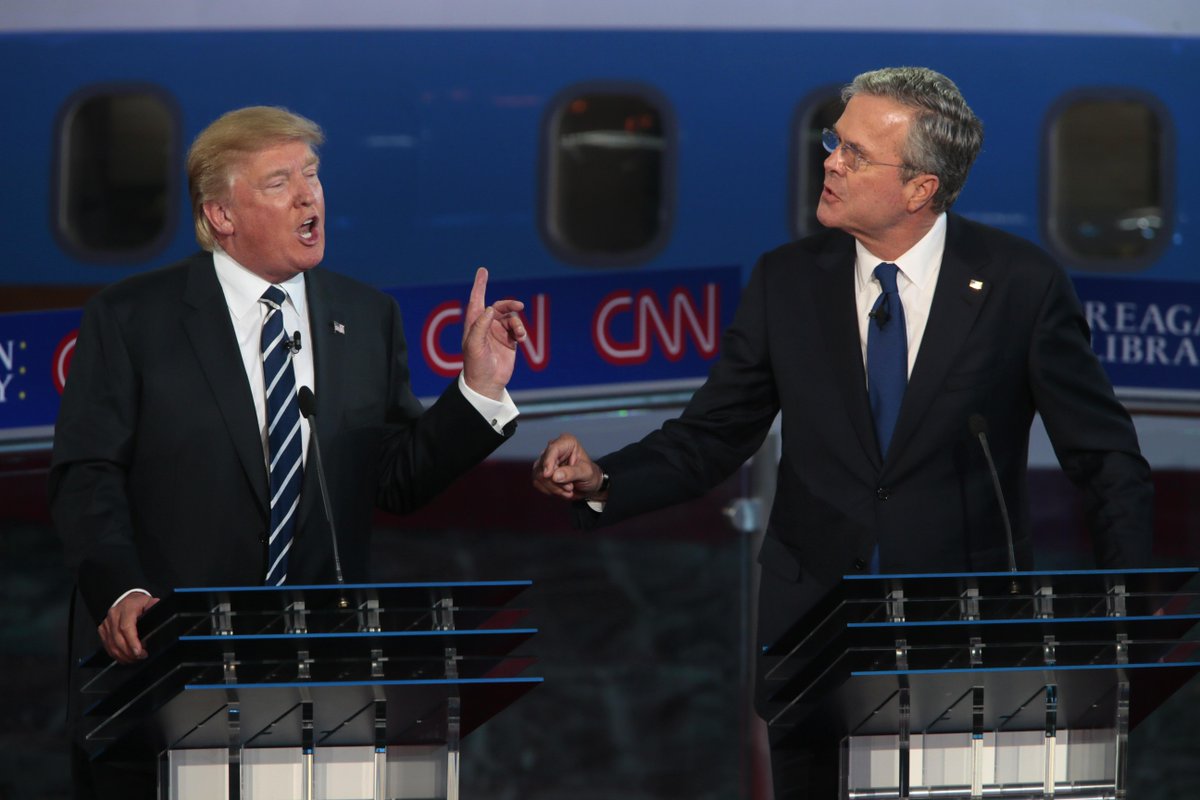
(Robert Gauthier / Los Angeles Times)
Zeroing in on Hillary Clinton
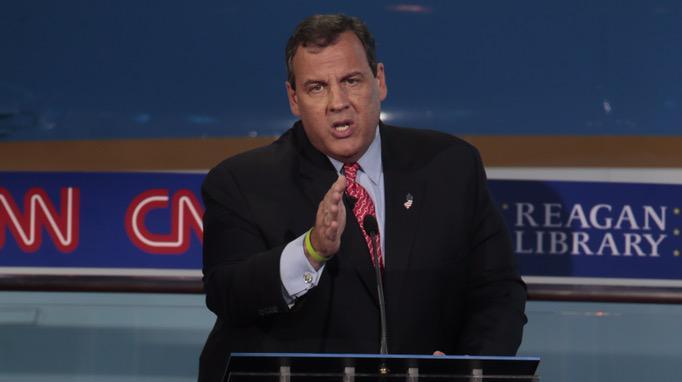
(Robert Gauthier / Los Angeles Times)
Trump sounds populist notes, changing the GOP conversation
Are we there yet?
Answer: Another hour and five minutes.
Watching from the back of the Regent Theater, Qathryn Brehm isn't pleased with most of the Republican candidates' responses.
She didn't like their comments about defunding Planned Parenthood. She didn't share their thoughts on Kentucky clerk Kim Davis' decision not to grant gay marriage licenses.
"Kim Davis is working a civil job. She should be held accountable," Brehm said.
Brehm, a Democrat, said she came to the L.A. Times watch party to learn about issues from the GOP's point of view.
"It's interesting," said Brehm, executive director of the Downtown Los Angeles Artwalk.
Ashley Sullivan saw it differently, calling the debate a "farce."
"I don't see anything that resonates with me," said Sullivan, 32, who doesn't claim either major party as her own.
"They want someone who puts on a good show," she said, explaining Donald Trump's popularity.
Sullivan said she was particularly upset by the candidates' stances on women's health and Planned Parenthood.
She scoffed when Ted Cruz, saying he would defund Planned Parenthood, called the organization an "ongoing criminal enterprise."
"They're not dedicated to having our backs," she said.
Numbers on 'anchor babies' don't add up
Donald Trump and Carly Fiorina, who have gone head to head on many issues tonight, argued about how easy it would be to change the nation's current practice of automatically granting citizenship to all babies born in the U.S.
While Trump has pledged to end the constitutional protection of birthright citizenship for all babies, even those born to mothers in the country illegally, Fiorina warned that such a change would require "a long, arduous process in court."
"The truth is, you can't just wave your hands and say the 14th Amendment is going to go away," she said.
Although the candidates were talking as if there's been a surge in such births, the number is in fact on the decline.
According to the nonpartisan Pew Research Center, the number of babies born to immigrants in the U.S. illegally fell to 295,000 in 2013, down from a peak of 370,000 in 2007.
Such births still made up 8% of total U.S. births in 2013, the center found.
The downward trend echoes the overall drop in illegal immigration in recent years, which has been driven largely by a decrease in the number of immigrants crossing illegally from Mexico.
The population of immigrants in the country illegally dropped about 1 million during the Great Recession of 2007-2009 and has remained stable since.
"When the population went down, the births went down," said D'Vera Cohn, who cowrote the Pew report.
The issue has been in the spotlight in recent months, with Republican presidential front-runner Trump and other GOP candidates decrying such children as "anchor babies," a term considered derogatory, and calling for an end to automatic citizenship for children born to immigrants in the country illegally. They say that the practice encourages illegal immigration.
Time for a commercial break
Some props to Fiorina
Carly Fiorina came prepared to debate, and many viewers are impressed -- even if they don't like her policies.
Tweets from Clinton on the other side of the aisle (and the language barrier)
Democratic presidential front-runner Hillary Rodham Clinton took the opportunity to troll several Republican candidates during the debate, tweeting at different turns that Donald Trump should "stop complimenting women and start respecting them," and saying that all 11 candidates support defunding Planned Parenthood.
But as the GOP debates focused largely on immigration, Clinton's campaign account took a different tack, tweeting in Spanish.
"Freedom includes the right to speak in any language," Clinton tweeted. "That makes us strong as a country and is something that we must celebrate - not denigrate." The tweet came shortly after Trump insisted, "This is a country where we speak English, not Spanish."
As candidates battled over the practicality of Donald Trump's suggestion that the federal government deport 11 million immigrants, she called the idea "totalmente absurda" - totally absurd.
And earlier, as the first Republican debate was about to get underway, Clinton shared an op-ed she wrote for Univision, saying, "As president, I will always be with the Latino community."
Tear up the Iran nuclear deal? Not so fast, some candidates say
Republican presidential candidates on stage began showing new divisions on the wisdom of dumping the controversial Iran nuclear deal.
Sens. Marco Rubio of Florida and Ted Cruz of Texas said they would tear up the deal immediately. But former Florida Gov. Jeb Bush, Ohio Gov. John Kasich and Sen. Rand Paul of Kentucky suggested that doing so might not be a good idea. Front-runner Donald Trump has said the same in the past.
"We don't know what's going to happen in 18 months," said Kasich.
"We are stronger when we work with the Western civilization -- our friends in Europe," he added. "Just doing it on our own, I don't think is the right policy."
"It's not a strategy to tear up an agreement," said Bush. "A strategy would be, how do we confront Iran?"
Not a great night for Jeb Bush
This photo was taken about an hour and a half ago, but it feels like much longer:
Bingo!
Few Republicans caution against shutdown over Planned Parenthood
With just days to go before another possible federal government shutdown, the Republican candidates for president reminded voters why Congress is once again courting a crisis.
Only Ohio Gov. John Kasich forcefully argued against shutting down the government over federal funding for Planned Parenthood.
“Be very careful about that,” Kasich said. Americans “are going to shake their heads and say, 'What's the story with these Republicans?'”
Republicans in Congress, led by Texas Sen. Ted Cruz and others, have vowed to cut off federal money for Planned Parenthood after videos disclosed the organization's practice of donating fetal tissue for research.
Already, federal law prohibits federal funds from being used for abortion services, except in cases of rape, incest or a threat to the life of the mother, but federal money is provided to Planned Parenthood for other healthcare and family planning services.
“We need to stop surrendering and start standing for our principles,” Cruz said.
Carly Fiorina did not say whether it was worth a shutdown fight, and Wisconsin Gov. Scott Walker said Republicans shouldn't be fighting with one another over the issue. Most of the candidates oppose abortion.
“This is why people are upset with Washington,” Walker said.
New Jersey Gov. Chris Christie suggested there were better issues for a shutdown fight with President Obama -- tax reform, repealing the Affordable Care Act.
“We should be doing these things and forcing the president to take action,” Christie said.
Crowd pleasing line
Here's what really happened when Carly Fiorina led Hewlett-Packard
Carly Fiorina's record at Hewlett-Packard, which helped sink her 2010 run for U.S. Senate in California, came under new scrutiny during Wednesday's GOP presidential debate when she was asked to defend her tenure there.
“I led H-P through the worst recession in 25 years," she said. "We had very strong competitors who literally went out of business.
“Yes, we had to make tough choices,” she added.
Fiorina was chief executive of the Silicon Valley firm from 1999 to 2005. She oversaw the controversial acquisition of Compaq and the layoff of 30,000 employees. The company's stock had lost half its value when she was fired. Fiorina argues that she made tough decisions that helped Hewlett-Packard survive the tech industry recession.
Trump weighs in on birthright citizenship
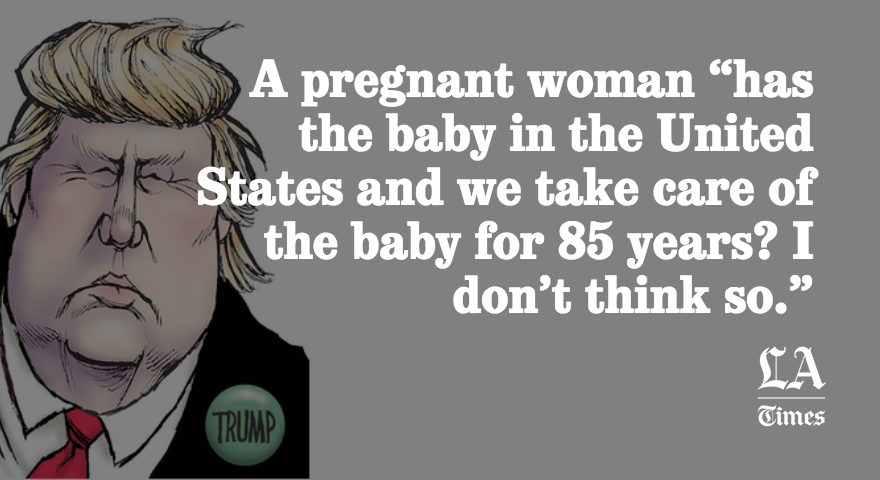
While GOP battles on stage, Democrats open fire on Twitter
The second Republican presidential debate has featured plenty of barbs on stage, but Democratic candidates Hillary Rodham Clinton and Bernie Sanders have been picking apart the GOP candidates' debate performance on social media.
Trump gets flak over comments on women
Discussion of controversial videos targeting Planned Parenthood eventually led to talk about women's healthcare, and Donald Trump pledged to “take care of women.”
This woman, at least, isn't clamoring for that:
Trump also caught flak after sparring with Carly Fiorina over his comments about her appearance and with Jeb Bush over mentioning Bush's wife in previous comments on immigration policy.
'Speak English'
The phrase under debate on the stage tonight often provokes strong emotion.
This summer that demand -- "speak English" -- made headlines after an incident at an IHOP restaurant in Koreatown. In a tense encounter captured on video, an older woman yelled at another woman for speaking Spanish and demanded she speak English instead.
"I speak English," was the emotional response of the immigrant from El Salvador.
Carson says immigrants here illegally should work in the agricultural industry
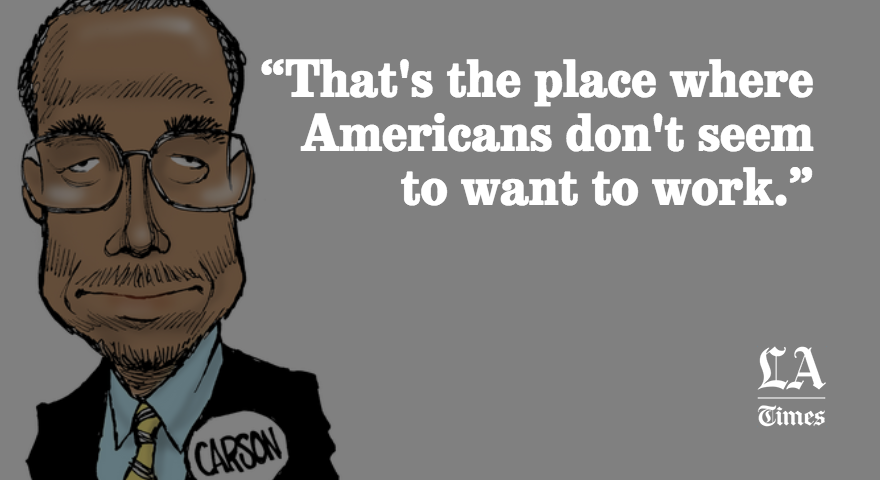
Chris Christie on people who have overstayed their visas
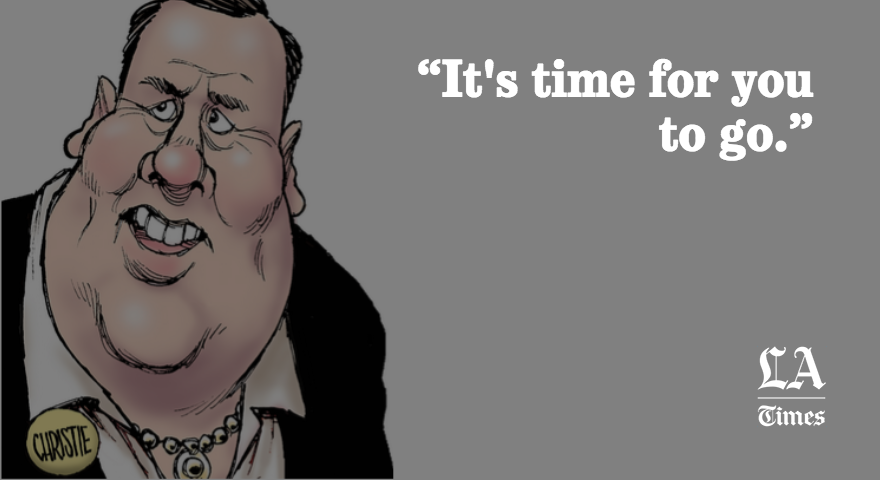
Trump tries to make up for comment about Fiorina's looks with comment about Fiorina's looks
It was the moment many were waiting for. Carly Fiorina was asked about a controversial Donald Trump comment in a Rolling Stone profile in which the New York businessman insulted her looks.
Fiorina was waiting, too. She smiled and gave a measured response. “I think women all over the country heard very clearly what Mr. Trump said.”
The comment got the loudest applause yet.
Trump responded by trying to dig himself out of the hole, but still found a way to comment on Fiorina's physical appearance.
“I think she's got a beautiful face, and I think she's a beautiful woman," he said.
So what do the San Diego donors think?
What was that about 'side deals' with Iran?
Politicians opposing President Obama's landmark Iran nuclear deal have made much of the related agreements between Iran and THE United Nations' nuclear energy agency, but the reality is not so simple.
Under standard International Atomic Energy Agency procedures, such agreements are secret. Here are some of the details.
They 'hate it!'
Students weigh in

Kelly Kristoff and Lauren Carter (Sonali Kohli / Los Angeles Times)
Kelly Kristoff will be 18 by the election. She came to the watch party ready to listen. A student at St. Lucy's in Glendora, Kelly said of her first vote: "It's like your first contribution to ... bettering the government."
Kristoff's friend and classmate Lauren Carter said she supports Bernie Sanders because he's the most liberal candidate.
This will also be her first vote. Sanders, she said, pays attention to young voters, and she likes that.
"We're going to be living in this country, making big decisions. This is one of the first times that I'm trying to get more involved."
Kristoff and Carter are in a government class together, and they frequently debate issues in class. Today they both want to learn about the Iran nuclear deal and the candidates' thoughts.
Miriam Antonio and her brother Alan said they both support Sanders.
Alan, a sophomore at Robert F. Kennedy High, credits his sister with getting him into politics. Until that happened, he said, "I was kind of ignorant."
Miriam, a Fairfax High senior and a Democrat, said she disagrees with Trump's comments about "anchor babies" and immigration.
The time Jeb Bush bested Donald Trump
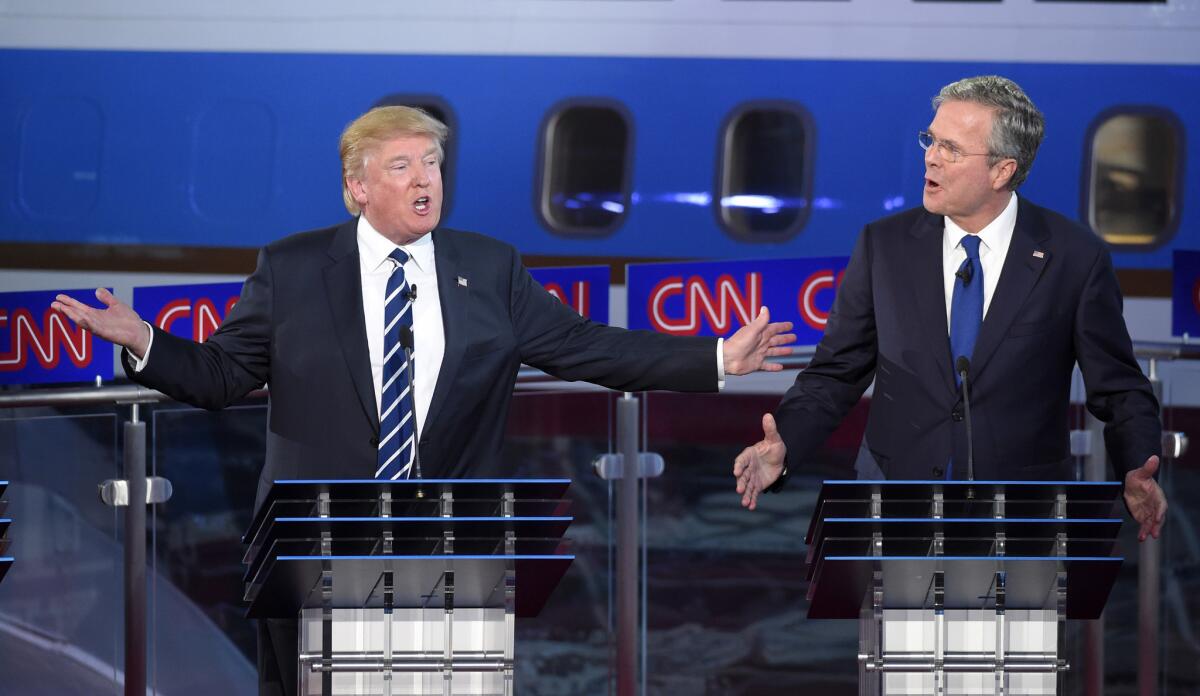
Republican presidential candidates, former Florida Gov. Jeb Bush, right, and Donald Trump both speak during the CNN Republican presidential debate at the Ronald Reagan Presidential Library and Museum on Wednesday, Sept. 16, 2015, in Simi Valley, Calif. (AP Photo/Mark J. Terrill)
Jeb Bush wasted no time targeting Donald Trump in tonight's debate.
Responding to Trump's criticism that he's beholden to campaign donors, Bush said the only donor who wanted something from him was Trump himself.
"People are supporting me because I have a proven record of conservative leadership. The one guy that had some special interest that I know of, that tried to get me to change my views on something, that was generous and gave me money, was Donald Trump. He wanted casino gambling in Florida."
When Trump tried to cut in, Bush cut him off. "Yes, you did," the former Florida governor interjected. Bush did take a stance against gambling, leading to Trump abandoning plans to open a casino with the Seminole Tribe of Florida, according to CNN.
Trump responded dismissively. "If I wanted it, I would have gotten it."
It was a fierce exchange early in the debate, with both candidates gesturing so broadly they almost touched each other. Trump, who has criticized Bush as "low energy," fired at his opponent, "More energy tonight. I like it."
Bush, who had described himself early on as a "joyful tortoise," focusing on a positive campaign, rapidly lost ground to Trump over the summer and has in recent weeks gone on the offensive. The Times' Seema Mehta detailed the change in strategy:
A race to the outside
Several candidates are playing up their outsider status in the debate tonight, making "politician" sound like a four-letter insult.
Carly Fiorina had strong words about corruption in government. "This isn't about replacing a 'D' with an 'R,'" she said. "This is about changing the system."
Gov. Chris Christie highlighted his tussles with a Democratic-led legislature in New Jersey.
To be engaged means to continue to talk.
Searching for their candidate

(Sarah Parvini / Los Angeles Times)
Dicey and Travis Madison are in the room for the L.A. Times watch party because they are still searching for a candidate to support.
The Madisons said during Barack Obama's presidency they've become more politically active, but they don't agree with all of his views. They're in the room tonight to learn more about where the GOP candidates stand on race relations. They're eager to hear what they plan to do to smooth relations with the police.
"We are gonna have kids soon," Dicey Madison, 35, said as the debate got underway. "There's going to be a problem if I have to worry about the police shooting them down."
Sitting in the filled Regent Theater with other interested voters -- both Republicans and Democrats -- Madison said she supported Donald Trump the most of all Republican candidates.
"I just wouldn't talk about women the way he does," she said.
Her husband, also 35, said he wanted to see politicians in the hot seat tonight.
"There weren't any sports on," he joked. "So I want to see their personas and what their point of view is."
The Donald Trump show
Trump vs. all: Candidates dogpile The Donald early in debate
Donald Trump was relatively calm during his opening statement, even referring to his "great temperament."
Then he attacked Rand Paul, and the field stopped trading pleasantries and started trading punches.
Trump line has them (still) laughing
It's not just Republicans struggling for face time in debates
As Republican presidential candidates prepared for their second debate Wednesday in Simi Valley, a 26-year-old Democrat across the country in Washington gathered signatures on petitions calling for more debates among Democrats.
Along with placard-holding protesters, the man, Ben Doernberg of Boston, slender and bearded, gathered outside the DNC headquarters in Washington to deliver what he said were 23,000 signatures from around the country.
The petitions were meant for Democratic National Committee chairwoman Debbie Wasserman Schultz, the congresswoman from Florida who has restricted the number of sanctioned debates to six despite support from two DNC vice chairs for additional debates. As founder of #AllowDebate, Doernberg said he had gathered 200,000 other signatures that he did not have in hand.
"The biggest thing is we're making clear to the chair of the DNC this isn't something that just elites and party officials care about," he said. "This is something grass-roots voters, Democrats, actually do care about."
Standing to the side, Dorenberg's mother, Rachel Unkefer, said her son has been politically active since his days supporting need-blind admissions at Wesleyan University.
A major push for more debates has come from the campaign of former Maryland Gov. Martin O'Malley. For O'Malley and other Democrats lagging behind Hillary Rodham Clinton, additional debates can help give them exposure.
O'Malley, lagging well behind Clinton and Sen. Bernie Sanders of Vermont in national polls, is looking for ways to energize his campaign. O'Malley campaign manager Dave Hamrick, who on Sunday urged other campaigns in a letter to support six additional debates, told the crowd, "This is what democracy is all about."
There were more than two dozen sanctioned and unsanctioned debates in the last open Democratic primary in 2007-08. This time, however, candidates participating in unsanctioned debates may be barred from the party's other debates under new party rules. The first Democratic debate will be Oct. 13 in Nevada.
In comparison, at least nine Republican sanctioned debates are scheduled.
Though Doernberg expected between 150 and 400 people to protest, only about 60 showed up. Many were wearing T-shirts and holding placards supporting the campaigns of Sanders and O'Malley. What they lacked in size, they made up in energetic chants accentuated with bongo drums, call-and-response songs and even a poem.
"There's more than one candidate! Allow, allow, allow debate!" they chanted.
Soon after the 90-minute-long protest began, a woman emerged from the DNC building and accepted the stack of petitions. After that, the protest shifted into more of a jubilation.
Strong reactions to the start
Marco Rubio's water stunt a nod to California drought and his own gaffe
In his opening comments, Marco Rubio referenced California's long-running drought, saying he knew the state was running low on water.
The prop was also a nod to a previous gaffe in 2013, when he was delivering the Republican response to the State of the Union address.
During that speech, Rubio conspicuously looked to a bottle of water, reached for a drink while keeping his eyes on the camera, and then continued speaking.
Meanwhile, in New York
The Times' Evan Halper is at Hillary Rodham Clinton's campaign headquarters in Brooklyn, N.Y.
Can Lindsey Graham pull a Carly Fiorina?
The challenge for each Republican in the undercard debate is to get enough attention to leap to the main stage at the next one.
Carly Fiorina succeeded last time -- can Lindsey Graham pull it off now?
The South Carolina senator turned heads among debate watchers with a bit of humor and his tussles with other candidates on stage.
In the spin room afterward, Graham said his plan was “just to be myself.”
He also tried to draw a distinction between himself and the more dogmatic parts of his party.
“One thing I tried to do tonight is be honest,” Graham said. “We're not going to repeal Obamacare while [Obama] is president. We're not going to defund Planned Parenthood while Obama is president.”
To say otherwise, he said, is to “not be honest and fair to the American people.”
Chief Justice John Roberts, once a conservative favorite, now a punching bag
Chief Justice John G. Roberts Jr., a former Reagan White House lawyer, used to be a conservative favorite.
He led the court's conservative bloc to free political spending, to uphold gun rights and to protect the religious rights of Christian business owners, like the founders of Hobby Lobby stores.
But halfway through the first GOP debate Wednesday, it was clear how much all that has changed.
Over the last three years, Roberts has cast key votes in a pair of 5-4 decisions that upheld President Obama's healthcare law, and some Republican presidential candidates now describe his appointment as a disappointment or mistake.
As is often the case, Texas Sen. Ted Cruz said it first and mostly bluntly. He has accused Roberts of acting for “nakedly political reasons” to uphold Obamacare. In 2005, Cruz had described Roberts as a “principled conservative,” but now he says President George W. Bush made a mistake when he chose Roberts over conservative judges with a longer track record.
In the four-candidate undercard debate, Sen. Lindsey Graham of South Carolina and former Sen. Rick Santorum of Pennsylvania said they stood behind their votes to confirm Roberts because he was well qualified. But Louisiana Gov. Bobby Jindal criticized their support of Roberts and said that if he were president, he would have a “litmus test” for court nominees, which would include opposition to abortion.
After debate, Jindal continues assault on congressional Republicans
Louisiana Gov. Bobby Jindal continued his attacks on Congressional Republicans following Wednesday's early debate, saying he's "sick" of watching members of the GOP "surrender" caucus in Congress.
"I'm tired of hearing from the Republicans in D.C. about why they can't get things done," he said when talking to reporters following the debate. "They can't defund Planned Parenthood. They can't fight back against the Iran nuclear deal. ... Obama is able to out-negotiate House and Senate Republicans. It's time for Republicans in Washington to stand up and fight for our belief. This is why the voters are so mad."
Throughout the early debate, Jindal assailed Republicans in Washington, including Sen. Lindsey Graham of South Carolina, for not standing for conservative principles.
"It's time to fight for the country, it's time to fight for the party," he said following the debate.
Overshadowed, but still a good show
Not picking sides
Sign up for the Essential Politics newsletter

A daily email blast to showcase the best from our political teams covering the presidential campaign, California politics and governing in Sacramento. It will be one vibrant hub for everything you want to know about what's happening in politics
Meanwhile, in San Diego
The San Diego Union-Tribune's Gary Warth is with Republican donors at a party put on by the Lincoln Club. He'll be keeping us up to speed on the favorites among those in the room.
Three takeaways from the undercard: Donald Trump, Lindsey Graham and Kim Davis
These are the ones who didn't make it, the presidential candidates who had to walk tall to the debate stage at the Ronald Reagan Presidential Library in Simi Valley, even as CNN's Wolf Blitzer announced that the “second-tier candidates” had arrived for their second-tier debate: Sen. Lindsey Graham of South Carolina; Gov. Bobby Jindal of Louisiana; former Gov. George Pataki of New York; and former Sen. Rick Santorum of Pennsylvania.
But they still had hope. A strong showing on the second stage could earn them a call-up to the big leagues, as Carly Fiorina demonstrated through her performance on the second stage last month, which earned her a spot on the main stage in Simi Valley.
Here are the top takeways from the second-tier debate:
Trump, Trump, Trump: He wasn't on stage, but CNN moderators kept taking about Donald Trump and the candidates followed suit. Even as Pataki complained that the first four questions were about Trump, he added a strong statement about the billionaire in hopes of getting attention: “Let me say this flat out: Donald trump is unfit to be president of the United States.” The next series of questions were dominated by Trump's favorite issue, immigration.
Jindal called Trump a narcissist and a non-Republican who would destroy the party's chances of winning the nomination, then praised him later as a man unafraid of confronting D.C. insiders. Santorum sort of defended him, saying “personal attacks just please one person, Hillary Clinton.”
The sunniest warrior: Yes, Lindsey Graham is campaigning as a single-issue candidate determined to scare the snot out of America over the threat of Islamic extremism. And yes, he opened his comments by suggesting that anyone unwilling to send thousands of combat troops to Syria should not be considered presidential material.
But he also told the best jokes of the night, mostly at his own expense. As a message candidate, he seems unburdened by the weight of his poor poll standing.
His recipe for breaking congressional gridlock? “That's the first thing I'm going to do as president. We're going to drink more.”
His reading habits? “By the end of this debate [it] will be the most time I've spent in any library.”
On the need for immigrants to learn English? “I don't speak it very well but look how far I've come.”
Social issues and the primaries: Republicans have tried to steer the party away, but the grass-roots care deeply and the candidates are responding.
The fight over how to respond to the Supreme Court's legalization of same-sex marriage may have been the most contentious of the first debate. Santorum passionately defended Kentucky clerk Kim Davis' decision to deny marriage licenses because of her opposition to same-sex marriage. Pataki tried to set himself apart, denouncing the court decision while insisting he would fire a public servant who resisted the rule of law: “My response is, wow, we're going to have a president who defies the Supreme Court because they disagree?”
Love it or hate it?
Political junkies gathered in downtown L.A. for The Times' watch party are ready to let their feelings be known. Are you cheering or jeering? Tweet us at #LATparty
Expect more potshots at GOP lawmakers tonight
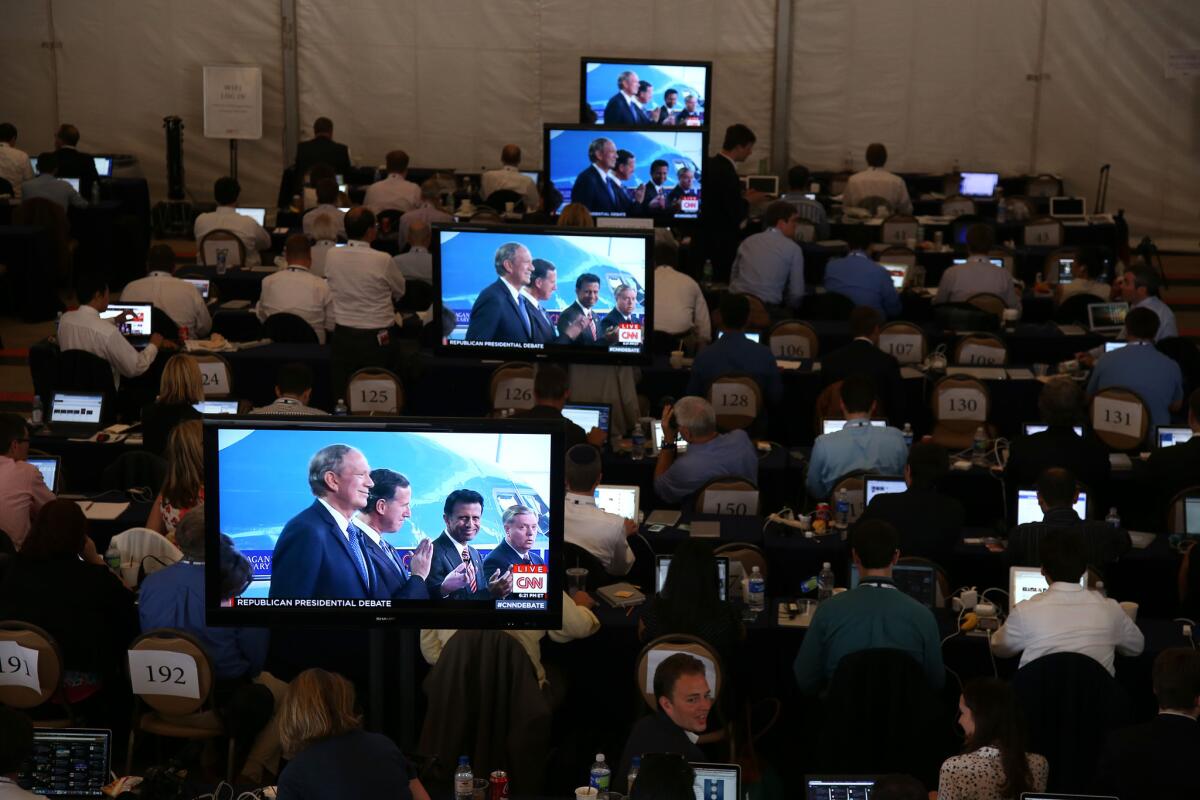
The first debate featured four Republican presidential candidates at the Reagan Library.
Slamming Republicans in Congress is a theme that's likely to recur in the prime-time debate. Here's why: The thing behind Republican voters' support of Donald Trump is anger at Republicans.
“People feel betrayed,” Greg Mueller, a longtime conservative activist and campaign strategist, said recently. “They feel like they keep working and fighting to elect Republicans to get us back to a limited-government approach to life, and all they get is more spending, more taxes and people who are afraid to fight liberal Democrats.”
Here's that ad comparing Trump's and Ronald Reagan's wildly different immigration plans
It was paid for by the National Immigration Forum Action Fund, a group that advocates for immigration:
Loose and ready to fight, Lindsey Graham steals spotlight early
Lindsey Graham set out to use his military experience and foreign policy credentials to stand out in the GOP's undercard debate.
But it was the Republican senator's views on immigration reform and his self-effacing sense of humor that wound up providing his moment to shine.
“In my world, Hispanics are Americans,” Graham said early in the debate, scoring a point in round one in the skirmish over immigration reform.
He also worked in two early jokes about his Southern drawl and his poor study habits. And when he is in the White House, he said, he'll improve congressional relations by sharing cocktails.
"We're going to drink more," he said.
Not that the senator shied from his national security credibility -- almost his entire campaign rationale is, as he put it, to “destroy radical Islam.”
Nor was he remiss in retelling his compelling family story -- growing up in a house behind his parents' bar, and having raised his young sister after his parents died.
But the loose and genial side of Graham stole the spotlight. Moderator Hugh Hewitt even acknowledged the senator was having a “good night.”
Other Republicans piped in on Twitter fast.
Graham has been trailing in the polls, but that has not diminished his enthusiasm for the fight.
On immigration, he was a founding member of the Senate's “Gang of Eight,” which passed the most comprehensive immigration overhaul in a generation, only to see it wither a slow death in the House. As the candidates were asked about immigration, he mocked the “peanut gallery” -- at that point, referring to rival Rick Santorum, but also a not-so-subtle barb at his mainstage rival Ted Cruz -- for what he sees as their outmoded thinking on how to fix the system.
He reminded his rivals that former President George W. Bush, who also tried to engage Congress in an immigration reform plan that would provide a route to citizenship, won enough of the Latino vote to win the presidency twice.
Santorum references Columbine martyr, but it's an urban myth
During a heated exchange about religious freedom replete with references to Kentucky County Clerk Kim Davis, Rick Santorum invoked the supposed martyrdom of student Cassie Bernall during the Columbine High School massacre in 1999 in Colorado.
Bernall was one of 13 people gunned down in the mass shooting and gained attention after reports suggested she was shot because she affirmed her belief in God to one of the gunmen.
The harrowing scene was picked up by several news outlets and led Bernall's mother to publish the book "She Said Yes: The Unlikely Martyrdom of Cassie Bernall."
But the story was disproved long ago.
Media accounts challenged the story in the months that followed, and in his definitive 2009 account of the massacre titled "Columbine," author Dave Cullen noted that Bernall did have her head bowed in prayer when she was shot.
But another girl, who was shot but survived, was the one who proclaimed her belief in God as the gunfire broke out.
Here's an idea: Raising taxes on high earners
Bobby Jindal drawing hard lines on high court
When the debate turned to discussion about the Supreme Court, Bobby Jindal didn't hold back. He blasted the appointments of Justice Anthony M. Kennedy, Chief Justice John G. Roberts Jr. and retired Justice David Souter to the bench, all choices made by Republican presidents, calling them a "mistake."
Jindal also promised to use a "litmus test" in choosing his Supreme Court nominees, a practice that presidents have historically avoided.
By the numbers
Sign up for Essential California
The most important California stories and recommendations in your inbox every morning.
You may occasionally receive promotional content from the Los Angeles Times.
